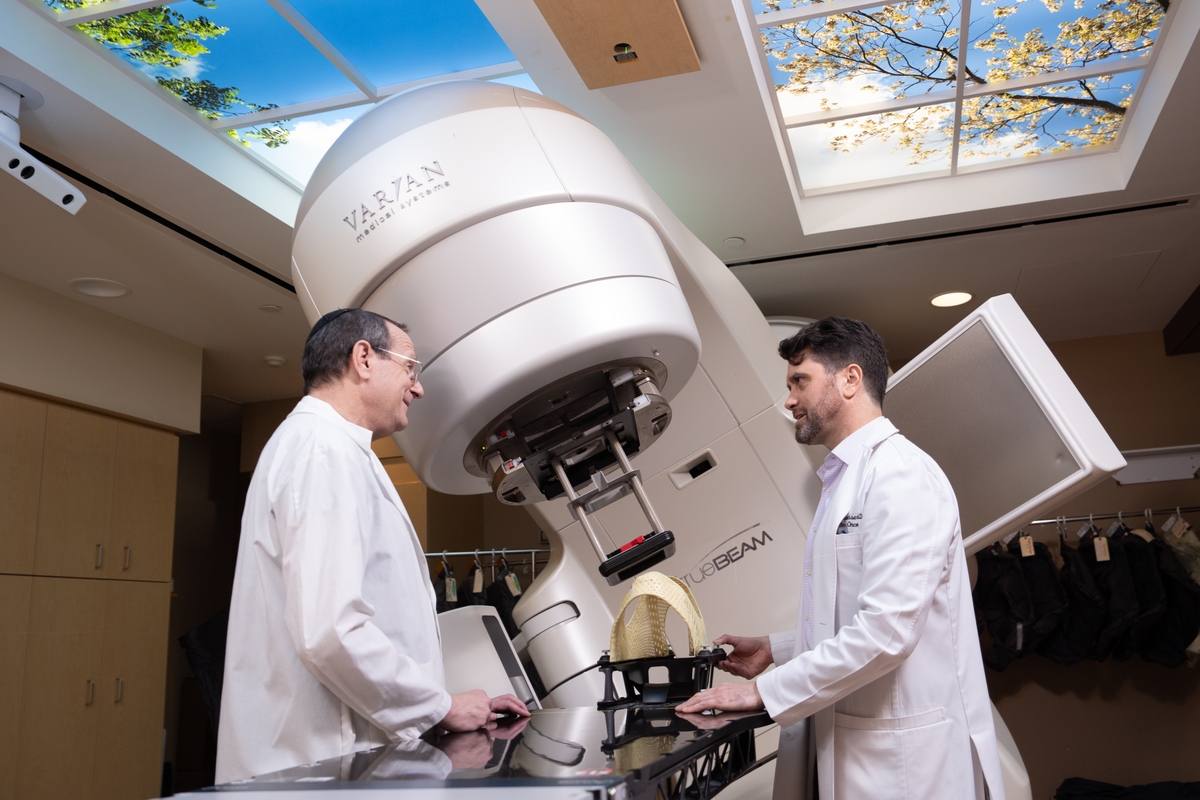The Lefcourt Family Cancer Treatment and Wellness Center takes a team approach.
Our disease-specific teams include doctors and other healthcare professionals from a variety of disciplines with experience treating your cancer. Our prostate cancer experts meet weekly to discuss your health, review test results, offer recommendations, and plan treatment that is best suited to your personal needs and goals.
Your care team includes:
- Urologic surgeons (urologists), who specialize in diseases of the urinary tract and male reproductive system.
- Medical and urologic oncologists, who use their cancer expertise to create and guide your medical treatment plan.
- Radiation oncologists, who plan and provide radiation therapy.
These specialists plan your prostate cancer treatment based on your unique medical history and symptoms and the stage of your cancer. Depending on your diagnosis, your doctor may recommend one or several treatment approaches.
Active Surveillance for Prostate Cancer
For some men, prostate cancer grows slowly and treatment is not immediately needed. Instead, your doctor may choose to monitor you closely with frequent visits and blood tests. This is called active surveillance. If your test results change and your prostate cancer may be growing, your doctor may then recommend starting treatment.
Surgery for Prostate Cancer
You may be a candidate for prostate cancer surgery if the cancer is confined to the prostate and has not spread. One of the surgical options available is:
- Prostatectomy: This involves the removal of the entire prostate gland. In many cases, this surgery is performed using robotic assistance, which allows for greater precision, smaller incisions, and a quicker recovery time. Robotic prostatectomy may reduce the risk of complications and improve outcomes for patients.
Our urologists are experts in surgery designed to preserve nerves in the area (nerve-sparing prostatectomy), which reduces the risk of complications. If you will be having surgery, your urologist will discuss the most appropriate approach for you.
Radiation Therapy for Prostate Cancer
Our radiation oncologists generally use two types of radiation therapy for prostate cancer, employing approaches that finely target prostate cancer tissue.
- External beam radiation therapy, such as stereotactic body radiotherapy (SBRT), delivers a precise dose of radiation directly to the prostate from a machine outside your body.
- Brachytherapy involves the implantation of a small radioactive seed inside the prostate to deliver a consistent dose of radiation over time.
Men with prostate cancer that has spread to the bones may receive radiotherapies—very small amounts of radioactive materials linked to a drug to deliver high-dose radiation directly to bone metastases and prostate cancer cells at other sites. This treatment has been shown to lengthen survival in men with advanced disease.

Focal Prostate Cancer Treatments
Some small prostate tumors that are confined to the prostate can be treated with minimally invasive therapies that are finely directed to the tumor, such as:
- Cryosurgery (or cryoablation), in which freezing temperatures are applied to the tumor through a needle to kill cancer cells.
- High-intensity focused ultrasound (HIFU), where high-energy sound waves are directed to the tumor to kill cancer cells with intense heat.
Medical Treatments for Prostate Cancer
At our Infusion Center, located on the Englewood Hospital campus, our medical oncologists and oncology nurses offer a comfortable and convenient experience for patients returning often for therapy. We also offer medical treatments at our Jersey City and Fair Lawn locations. Medical treatments used for prostate cancer include:
- Hormone therapy: In many men, male hormones called androgens fuel the growth of new prostate cancer cells. Hormonal therapies are medications used to slow prostate cancer growth by reducing androgen levels. They are often oral drugs (taken by mouth), so you can take them at home.
- Chemotherapy: Chemotherapy uses certain anti-cancer medications to attack prostate cancer cells. Doctors primarily recommend chemotherapy when prostate cancer cells have spread outside the prostate, or for prostate cancer that has come back after prior treatment.
- Immunotherapy: Sipuleucel-T (Provenge®) is a customized treatment made from your own immune cells that boosts the ability of the immune system to fight prostate cancer cells. We use this immunotherapy to treat some men with metastatic prostate cancer.
- Clinical trials: Our oncologists participate in many clinical trials evaluating promising new treatment options for prostate cancer. A clinical trial may give you access to a cutting-edge therapy that is not yet available as a standard treatment. Our oncologists will let you know if you may be eligible for any clinical trials. The decision to participate is entirely yours.
Geriatric Oncology for Prostate Cancer
At Englewood Health, we offer specialized care for older adults diagnosed with prostate cancer. Our team focuses on the unique needs of elderly patients, tailoring treatment plans to address both the cancer and any age-related health concerns. With a comprehensive approach that balances effective cancer treatment and maintaining quality of life, we provide personalized care that takes into account the patient's overall well-being and treatment tolerability.
Survivorship Services
After completing multidisciplinary therapy, patients are guided through a comprehensive survivorship meeting. This meeting provides an opportunity to review the treatments received and establish a personalized plan for ongoing surveillance and follow-up care. Our team will assess your current health status, discuss strategies for monitoring your recovery, and help ensure you have the necessary support for long-term well-being following prostate cancer treatment.